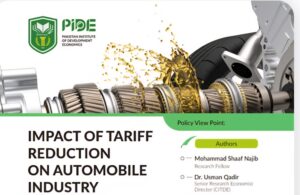Tariff Cuts Set to Reshape Pakistan’s Auto Industry: PIDE Report Released
While some jobs at OEMs may be at risk in the short run, new opportunities for businesses and employment are expected to emerge in import services, dealerships, after-sales, and parts markets. PIDE Sugestions
*Tariff Cuts Set to Reshape Pakistan’s Auto Industry: PIDE Report*
Islamabad, Report by Imrana Saghar (Komal)

The Pakistan Institute of Development Economics (PIDE) has released its latest Policy Viewpoint titled “Impact of Tariff Reduction on Automobile Industry”, authored by Mr. Mohammad Shaaf Najib and Dr. Usman Qadir. The report provides a holistic assessment of the impact of the government’s five-year tariff reform plan on Pakistan’s automobile industry. The reform plan, announced in the Federal Budget 2025–26, seeks to move Pakistan’s economy from import substitution towards an export-led growth model. The reform will streamline the customs duty structure, reduce tariff slabs, and lower the average tariff rate from 19% to 9.5% by FY2030. Specifically, for the automobile sector, tariffs on Completely Built Units (CBUs) will fall from 20% to 15% over five years, while surcharges on used vehicles will be gradually removed by 2030.
According to PIDE’s analysis, these reforms will reshape the automobile industry in several ways. On the domestic front, increased competition from imports will push local manufacturers to enhance quality and efficiency. While smaller or weaker brands may struggle, established and globally integrated firms are expected to adapt and compete. Reduced tariffs on both CBUs and CKD imports will lower production costs, improve affordability, and potentially expand car ownership in Pakistan. While some jobs at OEMs may be at risk in the short run, new opportunities for businesses and employment are expected to emerge in import services, dealerships, after-sales, and parts markets. The net affect though will depend significantly on how the existing automobile firms react and adapt to the policy change.
At the macroeconomic level, increased imports could raise Pakistan’s import bill, creating pressure on foreign exchange reserves and the exchange rate unless export growth keeps pace. Considering this, PIDE recommends that the government must ensure availability of the required foreign exchange to finance the increased import bill. PIDE also stresses on the need to stick to the policy change and not roll back after initial challenges that may arise as that would prove much more detrimental for the automobile industry and consumers both. For consumers, however, the reforms promise significant benefits, including increased and improved choice and availability of the vehicles along with competitive pricing.
Further, PIDE also recommends a new import framework particularly for the import of used cars in the country instead of the current mechanism where imports are done under three different schemes. PIDE notes that the loopholes within these schemes are being used to import used vehicles in the country, and suggests a vehicle quality based mechanism for commercial import of vehicles in the country to uphold safety standards while ensuring fair competition and promoting consumer welfare.
It has also been stressed to facilitate the development of a robust after-sales networks and stronger incentives for electric vehicles to ensure a smooth transition to an environmentally friendly future. The view point concludes by noting that tariff rationalization is not just an industrial reform but also a vital step towards consumer protection, modernization of the auto sector, and Pakistan’s integration into global value chains.
For further details, visit: https://pide.org.pk/research/impact-of-tariff-reduction-on-automobile*Tariff Cuts Set to Reshape Pakistan’s Auto Industry: PIDE Report*
Islamabad, Report by Imrana Saghar (Komal)
The Pakistan Institute of Development Economics (PIDE) has released its latest Policy Viewpoint titled “Impact of Tariff Reduction on Automobile Industry”, authored by Mr. Mohammad Shaaf Najib and Dr. Usman Qadir. The report provides a holistic assessment of the impact of the government’s five-year tariff reform plan on Pakistan’s automobile industry. The reform plan, announced in the Federal Budget 2025–26, seeks to move Pakistan’s economy from import substitution towards an export-led growth model. The reform will streamline the customs duty structure, reduce tariff slabs, and lower the average tariff rate from 19% to 9.5% by FY2030. Specifically, for the automobile sector, tariffs on Completely Built Units (CBUs) will fall from 20% to 15% over five years, while surcharges on used vehicles will be gradually removed by 2030.
According to PIDE’s analysis, these reforms will reshape the automobile industry in several ways. On the domestic front, increased competition from imports will push local manufacturers to enhance quality and efficiency. While smaller or weaker brands may struggle, established and globally integrated firms are expected to adapt and compete. Reduced tariffs on both CBUs and CKD imports will lower production costs, improve affordability, and potentially expand car ownership in Pakistan. While some jobs at OEMs may be at risk in the short run, new opportunities for businesses and employment are expected to emerge in import services, dealerships, after-sales, and parts markets. The net affect though will depend significantly on how the existing automobile firms react and adapt to the policy change.
At the macroeconomic level, increased imports could raise Pakistan’s import bill, creating pressure on foreign exchange reserves and the exchange rate unless export growth keeps pace. Considering this, PIDE recommends that the government must ensure availability of the required foreign exchange to finance the increased import bill. PIDE also stresses on the need to stick to the policy change and not roll back after initial challenges that may arise as that would prove much more detrimental for the automobile industry and consumers both. For consumers, however, the reforms promise significant benefits, including increased and improved choice and availability of the vehicles along with competitive pricing.
Further, PIDE also recommends a new import framework particularly for the import of used cars in the country instead of the current mechanism where imports are done under three different schemes. PIDE notes that the loopholes within these schemes are being used to import used vehicles in the country, and suggests a vehicle quality based mechanism for commercial import of vehicles in the country to uphold safety standards while ensuring fair competition and promoting consumer welfare.
It has also been stressed to facilitate the development of a robust after-sales networks and stronger incentives for electric vehicles to ensure a smooth transition to an environmentally friendly future. The view point concludes by noting that tariff rationalization is not just an industrial reform but also a vital step towards consumer protection, modernization of the auto sector, and Pakistan’s integration into global value chains.
For further details, visit: https://pide.org.pk/research/impact-of-tariff-reduction-on-automobile-industry/-industry/

